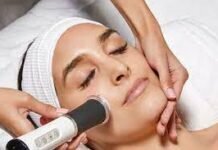Our skin requires oil to be moisturized and preserved. Oily-skinned people have fewer wrinkles. The disadvantage of having oiliness is that it causes acne and a greasy look. Oily skin develops when the skin’s sebaceous glands produce excessive sebum or oil.
There Are Several Causes Of Oily Skin, And They Generally Are Split Into Two Types:
- medical reasons
- external environmental conditions.
Processes in your body, such as fluctuating hormones, can all contribute to oily skin. Humidity, for example, can also lead to oily skin.
Any of The Following Factors Can Contribute To Oily Skin:
- Sebum production may be influenced by genetics. The greater your pores are, the more oil that skin produces. Pore size might differ depending on family and ethnicity.
- Androgens are hormones found in both men and women, such as testosterone. The sebaceous glands generate testosterone, and studies have connected higher amounts of hormones to increased oil production. Female hormones such as estrogen have been linked to decreased oil production, mostly in the skin.
- Growth hormones are associated with sebum production and are closely involved in acne development. These hormonal changes reach their peak levels all through adolescence, characterized by oilier skin.
- Stress causes a rush of stress hormones to enter the bloodstream. This could be one of the reasons why stress appears to aggravate acne.
- High-glycemic diets high in sugar, as well as simple carbohydrates, may promote sebum production. Simple carbohydrates may raise growth hormone levels in the body, resulting in more oil.
- Humidity can cause increased sweating and the production of oil. People living in humid areas are more likely to acquire oily skin. You might be more vulnerable to oily skin during humid, warmer months than during dry winter. Eczema can also be exacerbated by high humidity.
Oily skin may be with you for a long time, and you can try some home treatments to minimize it.
Using Face Cream for Oily Skin:
Many dermatologists advise at-home treatments. Using cream and sunscreen, add a protective layer to your skin. Apart from using it for oily skin, use face cream for dark spots.
Wash Your Face Regularly:
The habit of washing your face every couple of hours helps to keep your face oil free. This may not be the ultimate solution but it helps to keep your face clean and away from impurities.
Having a Clean Diet :
Your diet plays an important role. Avoid oily and junk food to maintain the balance in your skin. Go for clean food.
Clay Mask:
Using a clay mask can be essential as it will start absorbing the oil from the pores and give you a relatively less oily face or appearance. A clay mask can be helpful to you if used once a week.
Suppose you are a teenager and reading this! Don’t worry at all. This is all part of the process in your growing age. Using the right face cream and maintaining and healthy life would help you achieve a less oily appearance.










![Anso FG Reviews: UPDATED 2024 [ansofg.com] Anso FG Reviews UPDATED 2024 [ansofg.com]](/wp-content/uploads/2023/12/Anso-FG-Reviews-UPDATED-2024-ansofg.com_-100x70.png)







